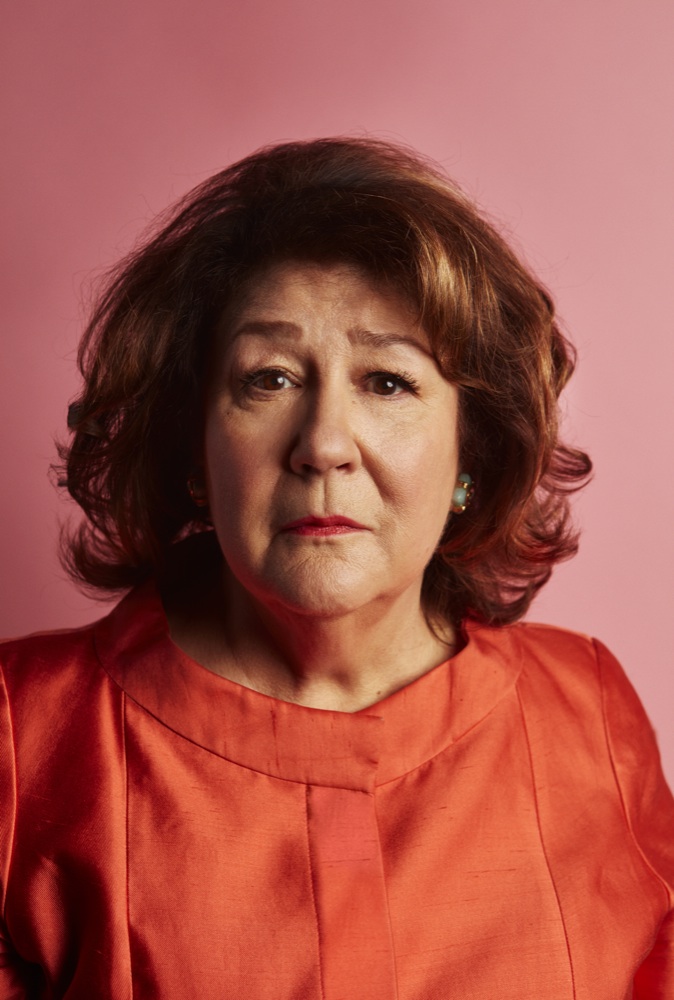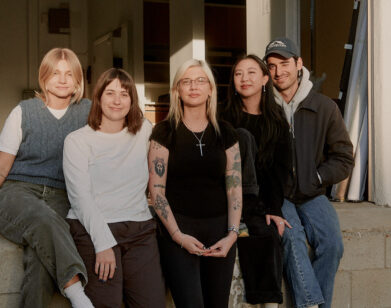Margo Martindale
MARGO MARTINDALE AT THE ROYALTON HOTEL IN NEW YORK CITY, JANUARY 2017. PHOTOS: DAVID NEEDLEMAN/JONES MANAGEMENT. HAIR: BRIAN MAGALLONES/EXCLUSIVE ARTISTS MANAGEMENT. MAKEUP: KIM BOWER/EXCLUSIVE ARTISTS MANGEMENT USING CHANEL ULTRAWEAR. RETOUCHING: FEATHER CREATIVE.
Margo Martindale has had many significant roles since she left the University of Michigan in the 1970s. The Jacksonville, Texas native originated the role of Truvy Jones in Steel Magnolias Off-Broadway in the late 1980s, and received a Tony nomination for her Broadway debut in Cat on a Hot Tin Roof in 2005. She’s appeared in plenty of Oscar-winning films like Dead Man Walking (1995), The Hours (2002), and Million Dollar Baby (2005).
It wasn’t until the modern golden age of television, however, that Martindale’s career truly caught up with her capabilities. In 2011, she joined Justified as murderous matriarch Mags Bennett, and won her first Emmy. From there, Justified creator Graham Yost brought her onto The Americans as the stoic Soviet spy handler Claudia, and she picked up her second and third Emmy Awards (plus another two nominations). Last month, she was reunited with Yost once more on Bryan Cranston’s Amazon thriller Sneaky Pete, which has already been renewed for a second season.
“I think Steel Magnolias, the play, put me on the map, even though I’d done a million plays before that,” Martindale explains, “but Justified changed the game. You had a glimpse into my dark side in Million Dollar Baby, but then it opened up. That part was just the perfect part for me. It was a complete about-face, but it showed that I could do more things than be the fun neighbor next door,” she continues. “I think I’ve turned down about 10 movies in the last six months. I want something different, that’s all.”
You can still hear Martindale’s southern accent when she speaks, though she’s lived on the same block in New York City since 1978. “I know everybody on this block. They’ve seen me grow from a thin 20-year-old to a big, fat 65-year-old,” she says with a laugh. “I love this city. I love how integrated it is, how everybody lives together.”
Next up, Martindale will return for another season of The Americans. She also has what she describes as a small role in Alexander Payne’s next film, Downsizing, with Matt Damon and Kristin Wiig. Her film Wilson, starring Woody Harrelson, premiered at the Sundance Film Festival last month.
EMMA BROWN: Do you come from a particularly creative family?
MARGO MARTINDALE: I came from an athletic family; my brother was a professional golfer, and my other brother was an All-American football player. I was the only daughter and the baby.
BROWN: Were your brothers nice to you when you were little or did they bully you?
MARTINDALE: Well, one brother, the one that is still alive, is 13 years older than me, so when I went to first grade, he went to college. But we’re very close now. My other brother, we were really close. He’s five years older than me and tortured me. [laughs]
BROWN: When you were five years old, what did you want to do when you grew up?
MARTINDALE: I don’t even think I had an idea of what I wanted to do. I know that I used my imagination all the time, I did stories and complete worlds in my backyard with all the little children in my neighborhood. But I also was very much interested in science and math and all of that. I loved numbers. I had an aptitude for numbers. I don’t know where that went. It’s certainly not here anymore.
BROWN: You started acting in Jacksonville, Texas, when you were in high school, and then you went to a two-year school, right?
MARTINDALE: It was a Methodist school in my hometown that happened to be the best little acting, theater department in the state of Texas: Lon Morris College. A teacher took an interest in me and helped me along the way. Her name was Zula Pearson. She said to me, “Margo, once you come into the room, go on-stage and go up and down those stairs until you know that you live there.” That’s sort of it. “Be there, live there, know that it’s your house.” It’s about being confident of your surroundings.
BROWN: Were you the star pupil?
MARTINDALE: Well, there were lots of star pupils. I was best actress two years in a row, but everybody was good.
BROWN: Did you know then that you wanted to act professionally?
MARTINDALE: I didn’t even think “professionally” was a word, but I knew that was what I was going to do, whether it paid me any money or not. Mostly it didn’t. [laughs]
BROWN: Were your parents keen to have you pursue acting?
MARTINDALE: They didn’t care. They were totally supportive of me, whatever I wanted to do. After all, I was a girl, so I’d probably just end up being married. [laughs] Then I got a scholarship to the University of Michigan and went there.
BROWN: I heard that you got 20 acting scholarships. Is that true?
MARTINDALE: Twenty-two. [laughs]
BROWN: How on earth did you choose between them?
MARTINDALE: The only reason I chose University of Michigan is cause Helen Hayes and Jimmy Stewart were on the front of their brochure and I knew who they were. That was the only reason. I had to work really hard; when you go into a school as a junior and you’re in the theater department, it’s a very, very thick club. Christine Lahti got all the parts, and even though I was certain I was going to get Ftatateeta in Shaw’s Caesar and Cleopatra, Christine Lahti had it, cause she was the star of that department. I’d say it took me a good three months to break in. I didn’t graduate from University of Michigan, I left three hours short because I got a job at Harvard at the Loeb Drama Center and I didn’t turn in my final paper. Isn’t that terrible?
BROWN: Have they since given you an honorary degree?
MARTINDALE: No, but they have asked me to give the commencement address to the theater department twice. I think next time, if they ask me, I’ll say, “If you give me an honorary degree, I’ll do it.”
BROWN: Or just forgive the three hours.
MARTINDALE: [laughs] Please forgive them! Yeah, I got a job at the Loeb Drama Center with Christopher Reeve and a guy named Jonathan Frakes. Jonathan wasn’t a star, but Chris was already a star and doing Threepenny Opera. It was just summer and I imagine it was $150 a week or something like that.
BROWN: How did you find yourself in New York?
MARTINDALE: Most of the people I was working with were from Juilliard and I became friends with all of them. I was dating one of the guys there, and then his girlfriend showed up. I thought, “Oh, dear. I thought he was my boyfriend.” [But his girlfriend and I] became best friends and we moved to New York together. She’s still my best friend.
BROWN: I heard you got your Actors’ Equity card through a David Mamet play.
MARTINDALE: That’s right. Doing a David Mamet children’s play.
BROWN: Once you had your Equity card, were you working consistently?
MARTINDALE: [laughs] Oh, no, no, no. I got my Equity card and then sat there. I think I got it in in 1975 and then I didn’t have another job basically until 1977. Then after 1977, I didn’t have another job till 1979.
BROWN: What was the theatre scene in New York like then? There are so many wonderful actors who came out that period—did it feel special at the time?
MARTINDALE: It just felt easier than it is now for anybody trying to break in. Now, it’s virtually impossible for these kids because you get an agent by doing a showcase, and you can’t get a showcase, if they have those anymore, unless you have an agent. It’s very, very, very difficult. [Then] it was kind of wide open. You could go to open calls and you could get a job that way. My best friend, the one I met at Harvard, she started the biggest dance studio in New York: Step Studio. But before that, she got a job as an agent’s assistant. That’s how I got an agent. Otherwise, I would not have gotten an agent for a long time because they would always say to me, “What are we supposed to do with you?” I was a young character actress and that was a hard spot.
BROWN: Is there a classical role that you always wanted to play but never got a chance?
MARTINDALE: I would love to play somebody English. I would love to play a really horrible, alcoholic or drug addict, something like that. [laughs] I like complication, let’s just say that.
BROWN: When you get a new role, what’s the first thing you do?
MARTINDALE: I go into the script and I read the script many times. Then I start trying to figure out the facts of the person—the givens. I try to do it like a math problem: “This is a given, this is a given, this is a given, so this must be this person, who probably would look like this and wear this.” It’s a process of coming up with somebody different. It’s gotten harder, not easier, because I need to keep being new. It’s always a surprise. Working on Sneaky Pete, I called Graham [Yost] and I said, “Well, after I watched the whole season, I can tell you that you were right, even though I thought you were wrong.” Because I’d concocted this insane backstory and Graham, because he’s a genius storyteller, and Fred [Golan] and all of those guys, who are incredible, [were like,] “No, this is a woman who just got in over her head.” Not unlike me, if I was in those circumstances. So it’s been really fun to do this new journey.
BROWN: Is there any one character you’ve played that you feel particularly fond of?
MARTINDALE: I always felt very fond of Big Mama in Cat on a Hot Tin Roof because she was sort of an innocent. I’d done that play when I was 21 and I lived with that language, and then I did it again on Broadway; it stirred around all the years of my life till I was the age of that character, and then I got to play her. But I’d say Mags Bennet, for me, was a character that will live with me for, I imagine, the rest of my life because she’s so smart and so free and so herself.
BROWN: Have you really fought for a role recently?
MARTINDALE: I fought tooth and nail for August: Osage County. I loved that part; I loved that play. I saw the play and I said, “I want to play that in the movie.” I was on a list, I guess, but I learned the part just like I was doing the play. I knew all of it forwards and backwards and I had to go in twice and do it. They were oddly unreceptive, but clearly receptive, it’s just that that was their demeanor. That was the last audition I had, but anything I want that I wasn’t given, I would audition for it because I love auditioning. It’s fun to win new friends. [laughs]
BROWN: How do you maintain the joy in your career?
MARTINDALE: The joy comes from being prepared and getting to share that with another actor or actress. That truly is a fabulously, joyously fun experience. I love, love, love acting, so if you can just go in and play, who could ask for more? There’s a play written by Don DeLillo that I used to go back and read out loud cause it thrilled me so. It was not a successful play, but he’s such a brilliant writer. It’s called The Day Room and that used to inspire me constantly.
SEASON ONE OF SNEAKY PETE IS CURRENTLY AVAILABLE ON AMAZON. THE AMERICANS RETURNS TO FX MARCH 7.







